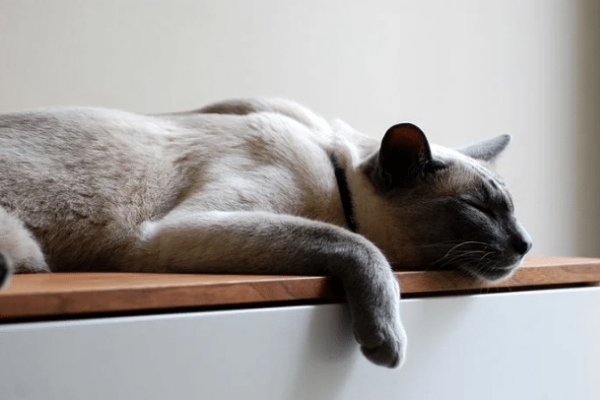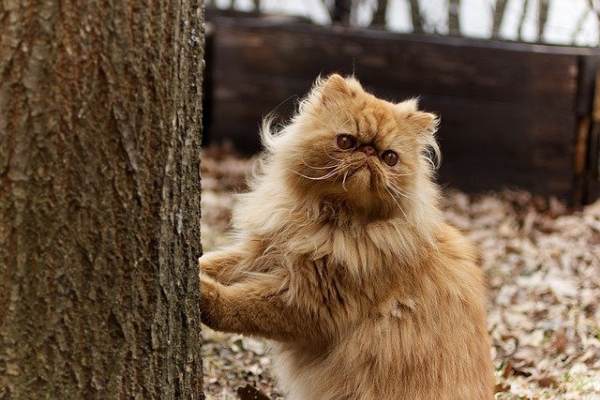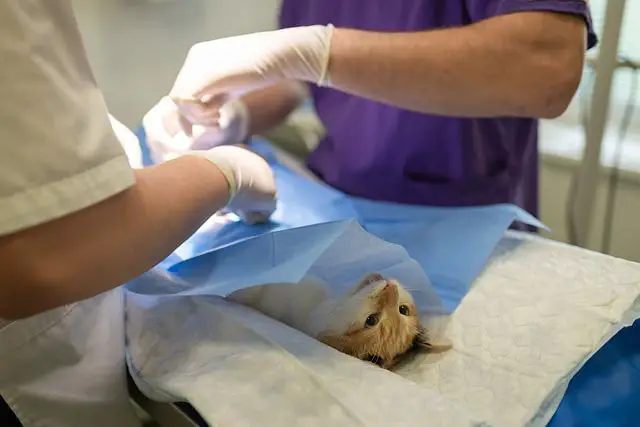Why Do Cats Shed So Much (8 Potential Reasons Explained)
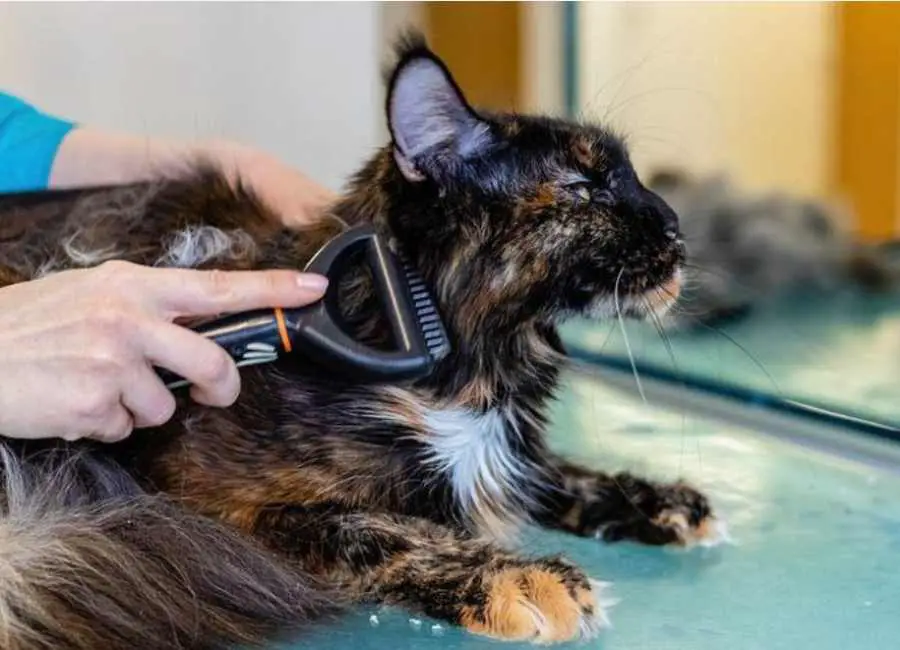
People always ask why do cats shed so much and that is exactly what I will be discussing in this post, so keep reading.
There are no completely hypoallergenic cat breeds in existence.
No cat breed is entirely safe for people who are allergic to cats, despite certain cat breeds producing fewer allergens than others.
Cats are just like dogs in terms of shedding. All cats shed their coats as their fur grows back.
Keep in mind that you can’t stop your cat from shedding, but you can reduce the level of shedding.
Why Do Cats Shed So Much
Poor nutrition, genetics, weather fluctuations, and sunshine exposure all impact how much shedding a cat produces. Cats also shed their coats as they renew their hair.
Most cats use their tongue to brush and groom themselves, and they also rub their fur against things to clean them.
When they shed, they are removing the dead hair and the dirt and debris that they have picked up to regrow new hairs.
Reasons why your cat is shedding so much
Here are some common reasons why your cat might be shedding so much:
1. Poor nutrition
Cats might shed abnormally due to a poor diet, and they can also shed because of nutritional problems.
If their diets are out of balance, cats will shed, which is a sign that they are not in good health.
Additionally important is choosing cat food rich in omega-3 fatty acids. It helps the cat’s coat stay healthy and lessens irritability, which can prevent frequent scratching.
This shows that you need to feed your cat high-quality food and maintain a balanced diet of nutrients.
Never choose any random food you see online; always speak with your veterinarian to be sure it’s the proper meal for your cat.
Till it stops working, continue to feed your cat whatever food works for you.
2. Seasonality
The fact that the temperature is getting warmer because of the time of year is one of the most common reasons why your cat sheds.
As the weather heats up, your cat starts to shed the extra hair that it had grown throughout the winter to stay warm.
Your cat will start to shed less and his fur will thicken once winter hits.
Cats will thus lose their winter coats in the spring in order to control their body temperature.
In the fall, they’ll get a thicker coat to be ready for the impending winter. As a result, expect greater shedding at some periods of the year than at others.
3. Fluctuations of hormones
In elderly cats, hyperthyroidism is a frequent illness brought on by excessive thyroid hormone secretion, which raises metabolic rate.
One of the likely adverse effects of this ailment when this hormone called thyroid is excessively produced in cats is excessive shedding.
If you have a female cat, you should be aware that she will go through bodily changes, including losing more hair than usual, since this is more frequent in female cats.
But after the female cat gives birth and her body returns to normal, the issue of excessive shedding normally goes away.
It is significant to understand that you should anticipate some degree of shedding anytime the cat has a hormonal transition.
4. Allergic reactions
A cat’s skin may become itchy as a result of allergies brought on by its diet or surroundings.
A cat may scratch, lick, or even bite itself as a result of this. Significant hair loss might ensue as a result.
Cats can have allergic reactions to things like food, dust, medication, and insect bites.
Make an appointment with your veterinarian if you have concerns about excessive shedding.
Cats’ skin reacts by shedding hair when they come into touch with anything to which they are allergic.
When you do observe this type of shedding, keep such allergy triggers away from your cat.
This type of shedding is rare; you will only sometimes notice it.
5. Certain Illnesses
You would notice that the hair is falling out in clumps more than anything else if your cat is losing hair as a result of the disease.
The pattern is different from when your cat regularly sheds.
But it’s important to be aware of it so you can quickly get your cat the care he needs to feel better.
Numerous disorders have the ability to cause or promote hair loss in cats.
The following are some typical health issues linked to hair loss in cats:
- Fungal infections
- Bacterial infections
- Adrenal issues
- Cancer
- Kidney disease
- Thyroid issues
- Liver conditions
- Skin diseases
6. Side effects of medication
Only after giving your cat any kind of drug and right when your cat starts shedding can pharmaceutical side effects cause needless shedding.
On the other side, certain medications might cause itching or scaling, which makes your cat scratch a lot and shed a lot.
Your cat may overgroom herself as a result of some diseases, leaving bare patches of hair.
Consult a veterinarian as a remedy. If your cat is shedding a lot, make an appointment for a checkup to rule out any health issues.
Ask your vet whether excessive shedding is a side effect of any medications your cat is currently on.
7. Changing cat food
This kind of cat shedding is usually present in cats whose owners enjoy experimenting with various feeds rather than sticking with what works best for them.
Hair loss and shedding in your cat might be brought on by a change in diet.
A diet low in nutrients for your cat increases the likelihood of this happening.
If you change your cat’s diet, and you see that its fur is reacting poorly, you might want to go back to the previous type of food.
When you move to fresh cat food that is deficient in all the necessary nutrients, a cat will shed more.
8. Parasite infestation
When they bite your cat, fleas, a common pet parasite, can also trigger an allergic reaction on the skin.
When these insects pierce a cat’s skin, the cat may lick, scratch, and bite the affected area in an effort to ease the pain; this might further cause unneeded shedding to occur.
Your cats may shed excessively due to both internal and external parasites.
Here are some worthwhile readings about cats and parasites:
- How Do Indoor Cats Get Parasites?
- 17 Most Common Symptoms Of Worms In Cats You Should Know.
- How Long After Deworming a Cat Are The Worms Gone.
When Do Cats Shed The Most
Cat owners are aware that cats occasionally shed, but they may not be aware of the periods when their cat sheds the most.
While some cats may shed more in the spring as they prepare to transition from their winter coat to their summer coat, other cats may do so in the fall as they prepare for the next winter.
However, there is no one period of the year when a cat sheds the most.
How to reduce excessive shedding in cats
Here are some common ways to reduce excessive shedding in cats:
- Provide high-quality cat food.
- Regular weekly brushing reduces shedding.
- Always keep the cat’s body temperature low
- Avoid and control parasite attacks on your cat.
- Give your cat a warm bath once in a while.
- Avoid giving your cat table scraps or stale food.
- Pay attention to your cat allergies and avoid them.
- Try vacuuming your house.
- Give your cat Omega-3 Shedding Supplement.
- Ensure that your cat drinks enough water.
- Schedule regular medical check-ups.

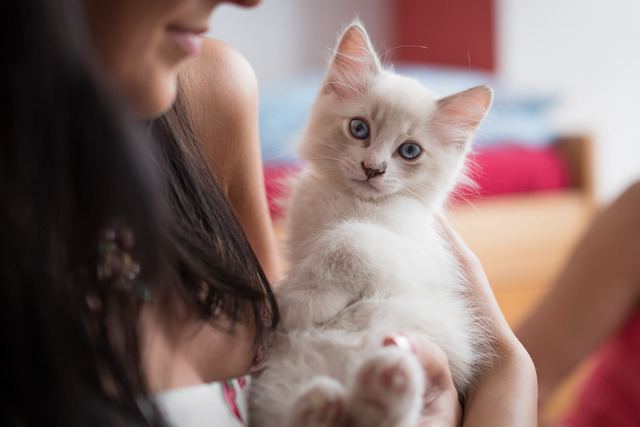
![Transition Outdoor Cat to Indoor [12 Steps] Transition Outdoor Cat to Indoor](https://petcreeks.com/wp-content/uploads/2023/10/pexels-jenna-hamra-776677.jpg)
